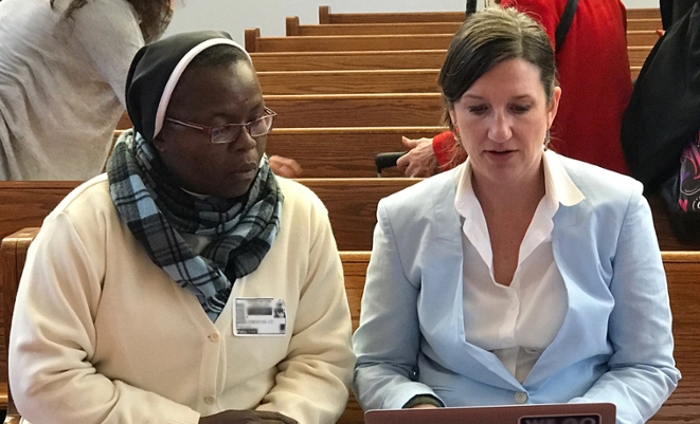Food Security and Women's Empowerment
U.N. session focuses on women’s economic empowerment
Get all our news

IPR anthropologist Sera Young (right) discussed how depression can relate to food insecurity and contribute to lost economic output among mothers.
The 61st session of the U.N. Commission on the Status of Women, which was held March 13–24 in New York, was dedicated to examining women’s economic empowerment in the changing world of work. In a panel organized by the Women’s U.N. Report Network, two Northwestern professors described some of the causes and consequences of women’s food insecurity, as well as how it holds women back.
IPR anthropologist Sera Young drew attention to an “invisible” factor that keeps women from achieving economic empowerment: depression. Young noted that adverse mental health, especially depression, is one of the largest contributors to disability-adjusted life years, a measurement that looks at overall disease burden based on the number of years lost due to ill health, disability, or early death.
“Who suffers depression the most? It’s women,” she explained. “And among women, who suffers depression the most? It’s pregnant and postpartum women.”
In her panel presentation, Young highlighted how food insecurity, which she has studied in Tanzania, Kenya, and Uganda, can actually contribute to depression.
She explained that a family is considered food insecure when it does not have regular access to food that’s of sufficient quality or quantity.
“Provisioning food for their family is one of the fundamental roles for women in most places in the world,” Young said. “Lots of women feel that when they’re failing at providing food for their family, they are actually failing at being a mother.”
Her ongoing research shows that this feeling of failure and the worry over finding enough food can lead to mental health concerns, which, in turn, lead to lost economic output among mothers.
Maternal depression also has negative consequences for children: Children whose mothers are depressed are not breastfed as much and exhibit poorer growth, as well as lower cognitive development.
However, there is a way to improve food security, according to Lori Post, director of the Buehler Center for Health Policy and Economics.
As part of the panel, she explained that women’s lack of rights contributes to being food insecure. Although laws have been passed in many countries giving women land tenure rights, tribal custom often prevents women from owning land. Post noted this shows how both public and political will are needed for social change.
Women are also denied a voice in deciding what crops to grow or where and when to sell them. In addition, selling across borders can lead to exploitation, as border guards demand bribes or sexual favors in return for access to markets. All of this can keep women from being able to feed their families.
According to Post, equal participation in agriculture would pull 120 million people out of hunger overnight. This would include women being able to own land, as well as having the opportunity to take out loans for technology and equipment to make farming more productive.
“Feed the mother, and the children will be fed as well,” she concluded.
Sera Young is an assistant professor of anthropology and an IPR fellow. Lori Post is a professor of emergency medicine and director of the Buehler Center for Health Policy and Economics.
Published: April 28, 2017.